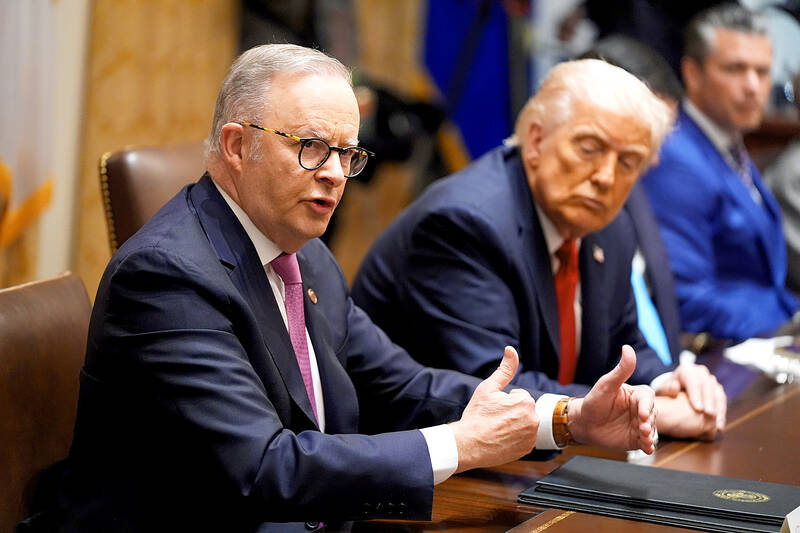US President Donald Trump on Monday signed a landmark pact with visiting Australian Prime Minister Anthony Albanese to boost the US’ access to rare earths and other critical minerals, an effort to counter China’s tight grip on the supply chains of key metals.
The two governments are to jointly invest in a swathe of mines and processing projects in Australia to boost production of commodities used in advanced technologies from electric vehicles to semiconductors and fighter planes.
Australia has an US$8.5 billion “pipeline that we have ready to go,” Albanese said at a meeting between the two leaders at the White House.

Photo: AP
“In about a year from now, we’ll have so much critical mineral and rare earths that you won’t know what to do with them,” Trump said.
The US has been locked in a rare earths tussle with China since Beijing fought back against Trump’s trade offensive earlier this year, imposing export curbs on the materials. It has since expanded those restrictions. The prospect of even tighter supply has injected momentum into a US push to build alternative production capacity, even as industry executives and analysts caution that replacing a vast network of mines and refining would not be swift.
The leaders said the agreement would include Australian processing of rare earths and other critical minerals, with Albanese adding that Australia had “capacity” to expand those efforts.
The US and Australia pledged to protect their domestic markets from “unfair trade practices,” including through adopting trading standards that involve “price floors or similar measures,” according to the text of the deal circulated by Albanese’s office.
The deal is to begin with the US and Australia each paying more than US$1 billion over the next six months for initial projects, with some further projects in both countries, Albanese said.
The document did not include details on which entities would provide that financing.
The Pentagon would help fund the construction of the planned 100 tonne-a-year Alcoa-Sojitz gallium refinery in Western Australia as part of the deal, the White House said.
The Export-Import Bank of the US is also issuing letters of interest for more than US$2.2 billion in financing on critical mineral projects.
Asked about the pact, Chinese Ministry of Foreign Affairs spokesman Guo Jiakun (郭嘉昆) said that “the formation of global production and supply chains is the result of market forces and business decisions.”
“Countries rich in critical mineral resources should play an active role in ensuring the security and stability of industrial and supply chains, and in safeguarding normal economic and trade cooperation,” he told a regular news briefing in Beijing.

NATIONAL SECURITY THREAT: An official said that Guan Guan’s comments had gone beyond the threshold of free speech, as she advocated for the destruction of the ROC China-born media influencer Guan Guan’s (關關) residency permit has been revoked for repeatedly posting pro-China content that threatens national security, the National Immigration Agency said yesterday. Guan Guan has said many controversial things in her videos posted to Douyin (抖音), including “the red flag will soon be painted all over Taiwan” and “Taiwan is an inseparable part of China,” while expressing hope for expedited “reunification.” The agency received multiple reports alleging that Guan Guan had advocated for armed reunification last year. After investigating, the agency last month issued a notice requiring her to appear and account for her actions. Guan Guan appeared as required,

A strong cold air mass is expected to arrive tonight, bringing a change in weather and a drop in temperature, the Central Weather Administration (CWA) said. The coldest time would be early on Thursday morning, with temperatures in some areas dipping as low as 8°C, it said. Daytime highs yesterday were 22°C to 24°C in northern and eastern Taiwan, and about 25°C to 28°C in the central and southern regions, it said. However, nighttime lows would dip to about 15°C to 16°C in central and northern Taiwan as well as the northeast, and 17°C to 19°C elsewhere, it said. Tropical Storm Nokaen, currently

‘NATO-PLUS’: ‘Our strategic partners in the Indo-Pacific are facing increasing aggression by the Chinese Communist Party,’ US Representative Rob Wittman said The US House of Representatives on Monday released its version of the Consolidated Appropriations Act, which includes US$1.15 billion to support security cooperation with Taiwan. The omnibus act, covering US$1.2 trillion of spending, allocates US$1 billion for the Taiwan Security Cooperation Initiative, as well as US$150 million for the replacement of defense articles and reimbursement of defense services provided to Taiwan. The fund allocations were based on the US National Defense Authorization Act for fiscal 2026 that was passed by the US Congress last month and authorized up to US$1 billion to the US Defense Security Cooperation Agency in support of the

PAPERS, PLEASE: The gang exploited the high value of the passports, selling them at inflated prices to Chinese buyers, who would treat them as ‘invisibility cloaks’ The Yilan District Court has handed four members of a syndicate prison terms ranging from one year and two months to two years and two months for their involvement in a scheme to purchase Taiwanese passports and resell them abroad at a massive markup. A Chinese human smuggling syndicate purchased Taiwanese passports through local criminal networks, exploiting the passports’ visa-free travel privileges to turn a profit of more than 20 times the original price, the court said. Such criminal organizations enable people to impersonate Taiwanese when entering and exiting Taiwan and other countries, undermining social order and the credibility of the nation’s